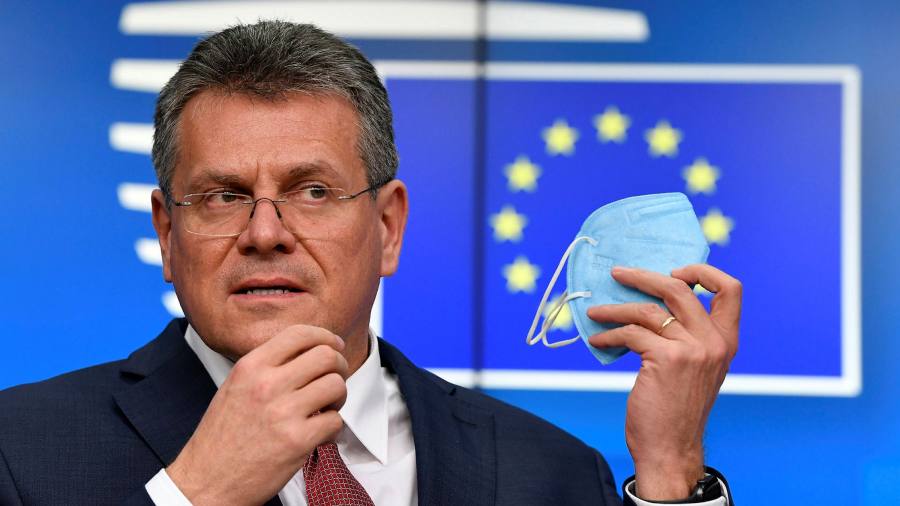[ad_1]
EU nations have thrown their weight behind Brussels’ plan to launch legal action against the UK over its decision to take unilateral steps to ease the impact of Brexit on Northern Irish businesses.Â
France and other states backed plans outlined by EU Brexit chief Maros Sefcovic at a closed-door meeting of ambassadors in Brussels on Tuesday, according to several diplomats present.Â
One said that the overall message from governments that intervened was that Brussels needed to be “calm and firm†in pushing back against the UK’s announcement that it would go it alone in extending grace periods on post-Brexit rules.Â
Under the terms of the Northern Ireland protocol — part of the 2019 Brexit divorce treaty that secured Britain’s formal exit from the EU — the region, while remaining part of the UK, must follow EU customs rules for goods. To avoid a land border on the island of Ireland, this required the creation of a trade frontier in the Irish Sea to ensure all goods flowing from Great Britain into Northern Ireland comply with the bloc’s rules.
With trade on certain goods such as food and agricultural produce facing stricter checks from next month, the UK was anxious to ease the impact on businesses and acted unilaterally to extend grace periods on issues such as the supply of goods to supermarkets.
Sefcovic’s legal response to the UK move, outlined to ambassadors on Tuesday, would involve a twin-track approach. One step would be for Brussels to launch a formal “infringement proceeding†against the UK that could ultimately lead to the country being hauled before the European Court of Justice.
Brussels has identified legal grounds in the EU and UK’s Brexit treaty that would give the ECJ jurisdiction over the row, even though the court’s remit is limited to breaches of EU law.
Britain would face fines or trade sanctions if it refused to comply with the court’s ruling in the dispute.Â
In parallel to sending this “letter of formal noticeâ€, Sefcovic told diplomats, Brussels also intends to send a second, “politicalâ€, letter to the UK warning that its actions were a breach of good faith, so paving the way for an independent arbitration process.Â
Sefcovic cautioned at the meeting that the entire plan was still a work in progress, although one diplomat said they came away with the impression it could be initiated within days.
Diplomats said that there was no opposition to the approach at the meeting and that France and other nations closely economically linked to Britain, such as the Netherlands, gave vocal support.Â
The UK has defended its actions, saying that the grace periods, for example on certification requirements for food travelling from Great Britain to Northern Ireland, needed to be extended to prevent disruption to the Northern Irish economy.Â
British officials insisted the government’s actions were “lawful and necessaryâ€, noting that infringement proceedings were “a common toolâ€. London is now trying to calm tensions with the EU.
The spat is an early test for post-Brexit relations, and for the EU’s ability to work with Brexit minister Lord David Frost.
The UK’s former chief Brexit negotiator declined to use a “hotline†system put in place by his predecessor Michael Gove and Sefcovic, meaning Brussels was caught unawares when Britain announced the measures last week. Hackles were also raised among EU governments by a Frost article in the Sunday Telegraph telling the bloc to “stop sulking†and to “shake off any remaining ill will towards us for leavingâ€.
[ad_2]
Source link





